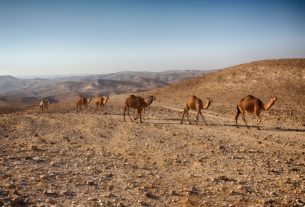When Yaakov gained the upper hand in his struggle against Eisav’s angel, the angel asks to be released, saying, “Send me away, ki alah hashachar – for the morning has arisen” (Genesis 32:27). “Shachar” in the sense of “morning” appears some 20 times in the Bible; “boker,” on the other hand, appears more than 200 times. What’s the difference between “shachar” and “boker”?
The Malbim (1809-1879) and Rabbi Shlomo Aharon Wertheimer (1866-1935) explain that boker stretches from neitz hachamah (sunrise) – that is, when the sun is visible on the horizon – until either four hours into the day or noon (see Berachos 27a). “Shachar,” though, refers to a point earlier than boker – the crack of dawn.
‘);
_avp.push({ tagid: article_top_ad_tagid, alias: ‘/’, type: ‘banner’, zid: ThisAdID, pid: 16, onscroll: 0 });
Rabbi Shlomo Alkabetz (1500-1580), the author of Lecha Dodi, writes similarly that “shachar” refers to the first rays of light that break through the night’s darkness (hence, the English term “daybreak”). Rabbi Alkabetz notes that Psalms 22:1 compares shachar to an ayalah (a female deer). Just as female deer jump swiftly and unexpectedly, so too the first rays of light shine forth suddenly without warning. And the planet Venus is called ayelet hashachar – “the morning star” – because it is often visible in the early morning before the sun rises.
Rashi (to Psalms 22:1) writes that “shachar” means morning but cites Menachem Ibn Saruk who maintains that the word’s primary meaning is examining/investigating/discerning. For example, “shocher tov” (Proverbs 11:27) refers to somebody who “seeks out” good. The Malbim explains that the “searching” connoted by “shachar” is consistent and persistent just like the sun rises consistently every morning.
The Ibn Ezra (to Genesis 1:5) and Radak (to Genesis 1:5 and in Sefer HaShorashim) write that the basic meaning of the bet-kuf-reish root from which “boker” derives is seeking out/discerning/investigating. Only in the light of day – which obviously begins in the morning – can one discern the difference between various objects. During the evening or at night, the lack of light makes everything appear mixed up and one cannot discern the differences between them. (“Erev” means both night and mixture.)
Other words derived from the bet-kuf-reish root include “bikoret” (investigation/inspection), bikkur cholim (during which one discovers the state of the ill person and what can be done to help him), “baker” (domesticated cattle, which require attention and supervision), and “boker” (a cowboy, who attends to the cattle and seeks out greener pastures).
A word derived from the shin-chet-reish root (besides “shachar”) is “shacharut” (Ecclesiastes 11:10), which refers to one’s youthful years. The Radak in Sefer HaShorashim explains that just like the morning is the beginning of the day, so too one’s youth is the beginning of one’s lifetime. Alternatively, Rashi explains that “shacharut” is related to “shachor” (the color black) because one’s hair tends to be blacker/darker in youth than in old age.
The prophet Yishaya describes something inexplicable as something “that has no “shachar” (Isaiah 8:20) because, metaphorically speaking, no light has been shed upon it.
The Talmud (Yoma 29a) assumes that shachar connotes morning as the end of night. Rabbi Wolf Heidenheim (1757-1832) explains that “shachar” is a cognate of “shachor” because the light of dawn banishes the darkness of night. Alternatively, yet along similar lines, Peirush HaRokeach explains that dawn is called shachar because the sky is still partially black/dark (especially on the western horizon) at this time.
The Zohar (Beshalach 46a) states that immediately before dawn, the pitch black night sky becomes especially overwhelming, and the sun’s light must penetrate that thick darkness. The British writer Thomas Fuller (1608-1661) famously expressed this idea in English: “It is always darkest just before the day dawneth.”
The Vilna Gaon (17201797) writes that the darkest part of the night is right before the crack of dawn just like the exile will be most difficult immediately before the Final Redemption. According to this explanation, “shachar” is related to “shachor” because the onset of morning breaks through the darkest or blackest point of the night.
Rabbi Eliyahu HaBachur (1469-1549) points out that throughout Chumash, Targum Onkelos consistently translates both “shachar” and “boker” as “tzafra.” However, in the books of Job, Proverbs, and Psalms – which incidentally share a cantillation system that differs from the rest of the Bible – Targum Onkelos translates “boker” as “tzafra” and “shachar” as “kritzuta.”
“Tzafra” is the typical Aramaic word used in the Talmud for “morning” and, interestingly, Rashi’s way of saying “good morning” was “tzafra de’mareh tav.”
Nachmanides (to Leviticus 14:4) explains that “tzippor” (bird) is derived from “tzafra” (morning) because birds wake up early in the morning to start chirping. Conversely, Rabbi Aharon Marcus (1843-1916) writes that “tzafra” is derived from “tzippor” because birds tend to chirp in the morning.
As opposed to Targum Onkelos, Targum Yonatan (to Genesis 19:15 and 32:27) translates “shachar” as “kritizin,” while Targum Neofiti simply Aramaicizes “shachar,” making it “shachara.”
Rabbi Moshe Kosover of Bet Chilkiyah suggests that the Aramaic “kritzuta”/“kritizin” (dawn/morning) is related to “kritzah,” winking (Psalms 35:19, Proverbs 6:13, and Yoma 19b). He explains that just as a wink is a small gesture that hints to something bigger, so too the dawn portends the imminent coming of daylight.
‘);
_avp.push({ tagid: article_top_ad_tagid, alias: ‘/’, type: ‘banner’, zid: ThisAdID, pid: 16, onscroll: 10 });




